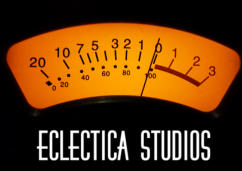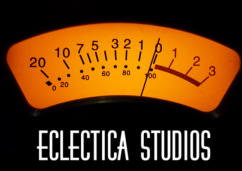Eclectica Studios builds business
Published Friday, January 4, 2002 12:00:00 AM
By KEVIN SMITH--STAFF WRITER
CHINO - In recent years, home-recording systems have become a welcome alternative for
musicians and singers who can't afford high-priced studio time. But it takes more than high-
tech equipment to produce a sweet sounding recording, according to Tim Dolbear, owner of
Eclectica Studios in Chino. ''Just because you have a really nice kitchen, it doesn't mean
you know how to cook. There's an incredible learning curve involved,'' said Dolbear, who
operates his 32-track recording, editing and mastering studio out of two upstairs bedrooms
in his Bernardo Court home. ''Every time I buy a new piece of equipment I spend two hours
every night learning how to use it. I've learned a lot over the years through trial and error
and through discussion groups on the Internet ... most people can't invest that kind of time.''
One bedroom houses the studio's mixing boards, monitors, computers and other electronic
equipment. The other serves as a ''live'' recording room, complete with a battery of
amplifiers, headphones and microphones. Dolbear, who used to work as a second engineer
at Good Night L.A. Studios in Reseda, opened Eclectica Studios a year and a half ago.
Business has never been better, he said, despite the nation's flagging economy and the
Sept. 11 terrorist attacks. ''After September, I thought (our business) would completely die,''
the 32-year-old entrepreneur said. ''But I've been going nonstop. I average one or two
sessions a day, five days a week.''
And the music is as varied as the techniques and equipment he uses. ''We get everything,''
Dolbear admitted. ''In the morning we might have a Christian singer songwriter and a death
metal band that night. I just finished a 19-song CD for Innisfree, an Irish Folk band.''
Singer/songwriter Meleisa McDonell, 33, of Escondido has recorded at Eclectica on several
occasions. ''I've seen his evolution,'' she said. ''I knew him back when he just had an eight-
track reel-to-reel and was learning to use it. There was always a growth period where he'd eventually get better than the equipment that he had.''
These days, McDonell says she won't record anywhere else. ''I could have my choice of a lot of studios near where I live, but I'd rather drive the hour and
20 minutes to record with him,'' she said.
Tess Taylor, president of the National Association of Record Industry Professionals, said home-recording systems have definitely wormed their way into the
music industry. ''It's now possible make a very high quality recording for very little money,'' she said. ''You can buy the equipment yourself or do it in a
friend's garage. The real question comes down to production value - that's a factor in whether it gets played on the radio.''
In the final analysis, home studios do lack some of the bells and whistles found at high-end facilities. But at $50 an hour, Eclectica's rates are far more
affordable than the alternative, which can run around $2,500 a day. ''The average cost for a first album for a nothing band is $200,000,'' Taylor said. ''If an
artist was really smart, they'd purchase the (home studio equipment) and record their music themselves.''
For more information on Eclectica Studios, contact them by e-mail at dlbmusic@eclecticarecordings.com








Eclectica Studios builds business
Published Friday, January 4, 2002 12:00:00 AM
By KEVIN SMITH--STAFF WRITER
CHINO - In recent years, home-recording systems have become a
welcome alternative for musicians and singers who can't afford high-
priced studio time. But it takes more than high-tech equipment to
produce a sweet sounding recording, according to Tim Dolbear, owner of
Eclectica Studios in Chino. ''Just because you have a really nice kitchen,
it doesn't mean you know how to cook. There's an incredible learning
curve involved,'' said Dolbear, who operates his 32-track recording,
editing and mastering studio out of two upstairs bedrooms in his
Bernardo Court home. ''Every time I buy a new piece of equipment I
spend two hours every night learning how to use it. I've learned a lot over
the years through trial and error and through discussion groups on the
Internet ... most people can't invest that kind of time.''
One bedroom houses the studio's mixing boards, monitors, computers
and other electronic equipment. The other serves as a ''live'' recording
room, complete with a battery of amplifiers, headphones and
microphones. Dolbear, who used to work as a second engineer at Good
Night L.A. Studios in Reseda, opened Eclectica Studios a year and a half
ago. Business has never been better, he said, despite the nation's
flagging economy and the Sept. 11 terrorist attacks. ''After September, I
thought (our business) would completely die,'' the 32-year-old
entrepreneur said. ''But I've been going nonstop. I average one or two
sessions a day, five days a week.''
And the music is as varied as the techniques and equipment he uses.
''We get everything,'' Dolbear admitted. ''In the morning we might have a
Christian singer songwriter and a death metal band that night. I just
finished a 19-song CD for Innisfree, an Irish Folk band.''
Singer/songwriter Meleisa McDonell, 33, of Escondido has recorded at
Eclectica on several occasions. ''I've seen his evolution,'' she said. ''I
knew him back when he just had an eight-track reel-to-reel and was
learning to use it. There was always a growth period where he'd
eventually get better than the equipment that he had.''
These days, McDonell says she won't record anywhere else. ''I could
have my choice of a lot of studios near where I live, but I'd rather drive
the hour and 20 minutes to record with him,'' she said.
Tess Taylor, president of the National Association of Record Industry
Professionals, said home-recording systems have definitely wormed their
way into the music industry. ''It's now possible make a very high quality
recording for very little money,'' she said. ''You can buy the equipment
yourself or do it in a friend's garage. The real question comes down to
production value - that's a factor in whether it gets played on the radio.''
In the final analysis, home studios do lack some of the bells and whistles
found at high-end facilities. But at $50 an hour, Eclectica's rates are far
more affordable than the alternative, which can run around $2,500 a day.
''The average cost for a first album for a nothing band is $200,000,''
Taylor said. ''If an artist was really smart, they'd purchase the (home
studio equipment) and record their music themselves.''
For more information on Eclectica Studios, contact them by e-mail at
dlbmusic@eclecticarecordings.com







